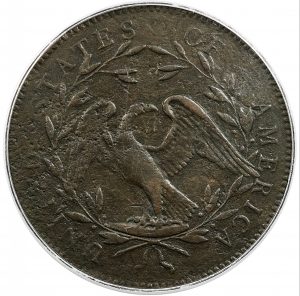A copper prototype of the first dollar struck at the fledgling U.S. Mint in 1794, two years after it was formed, has sold for $840,000 US (about $1.04 million Cdn.) at Texas auction.
The April 23 sale by Heritage Auctions offered the experimental copper strike of what would later become the pattern for more valuable silver versions. Referred to as the “No Stars Flowing Hair Dollar,” it opened at $312,000 US as it crossed the live auction block that day. In less than a minute, intense bidding pushed the coin – offered as Lot 4190 – well beyond its $350,000 US-$500,000 US estimate. It was certified as Very Fine-25 by Professional Coin Grading Service.
“This coin has traded hands just eight times during the last 230 years,” said Canadian numismatist Jacob Lipson, the owner of Jacob Lipson Rare Coins in Ottawa, who’s also a cataloger with the Texas-based auction house. “This is a coin of nearly unsurpassed historical significance.”
The 230-year-old prototype was previously off the market for 20 years, residing in the private collection of Bob Simpson, a lifelong Texas energy executive and the part-owner of the Texas Rangers.
Simpson’s collection has so far totalled more than $54 million US while being offered through Heritage Auctions.
“It would be easy, given the overwhelming scale and importance of the Bob R. Simpson Collection, for even the most impressive rarities to get somewhat lost in the fold,” reads the prototype coin’s lot description. “One could be forgiven for failing to appreciate just how rare and significant so many of these coins and patterns are given the sheer number of momentous offerings. This, however, is a coin that should stand out as a highlight among highlights.”

The coin (reverse shown) ‘has a strong claim to being the first dollar struck by the U.S. Mint,’ according to auctioneers.
A UNIQUE RARITY
The unique rarity was excavated from the site of the first Philadelphia Mint before 1876, according to the coin’s first owner, who gave it its first auction appearance in 1890.
The front of the coin features the adopted “Flowing Hair” portrait of Liberty with the word “LIBERTY” above and the 1794 year-date below. The reverse is the regular-issue silver dollar design with a “Small Eagle” standing on a rock within a wreath and “UNITED STATES OF AMERICA” around the border.
The copper coin features a lettered edge reading “HUNDRED CENTS ONE DOLLAR OR UNIT” with ornamentation between the words.
Experts have spent more than two centuries researching the prototype, which closely resembles later silver dollars minted in Philadelphia—coins now commanding upwards of $5 million US each. The variations between the copper prototype and its silver counterparts make it unique among dollars struck following the Mint Act of April 2, 1792 because it is missing telltale decorative stars on coins stamped later.
“It’s all in the stars,” said Lipson, who has been dealing for 11 years. “Similar ‘starless coins,’ such as a copper half dime, are held in the Smithsonian Institution’s National Numismatic Collection and this copper dollar is considered the companion piece to the half dime.”

